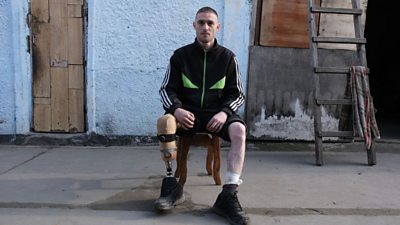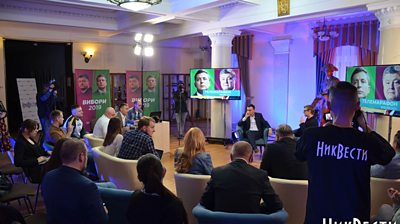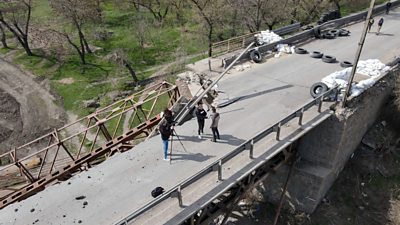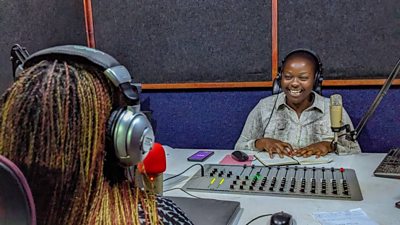More than three years into the full-scale war with Russia, Lidiia Bratchenko, a resident in the Ukrainian village of Yevhenivka in southern Ukraine, recalls her first encounter with land mines in a nearby forest, early in the conflict.
“The boys went to get firewood in the forest. At first, one mine blew up,” she recalled to local media. It injured one of her sons. “While the Russians [forces] took him to Nova Kakhovka [in Kherson region], the second came back with a wheelbarrow, and then he also blew up.”
Thankfully, Ihor and Oleksandr Virovkin survived. With the help of volunteers, they were taken to Norway, where they received further care and prosthetics. The brothers now live on a disability pension but have otherwise managed to establish a certain normality. They have families and are even able to play football with their children.

Sadly, this isn’t an isolated incident. The Mykolaiv region of southern Ukraine is one of the most heavily mined areas of Ukraine. Explosive devices were left behind by Russian forces who occupied the area in the autumn of 2022. It will take decades to clear Ukraine of this danger. In the meantime, information can help prevent injury and loss of life.
��ѿ��ý Media Action is training and mentoring local media outlets as part of a wider campaign across the country to warn people of the dangers, and what to do if they encounter unexploded ordnance. NikVesti, an independent online media outlet serving Mykolaiv, Kherson, and Odesa regions, is among them.
NikVesti CEO Oleh Dereniuha said: “At the very beginning of my journalism career, more than 10 years ago, I was surprised by the rather frequent press releases from the State Emergency Service about discovering and neutralizing mines left over from World War II. This means more than half a century had passed, and mines were still being found. We’ve been at war for three years now, and I fear that it will be future generations who will have to clear our land of mines. That’s a terrifying prospect.”
As part of this project, NikVesti is also sharing advice on how to talk to children about the dangers of landmines, without scaring them unnecessarily. Sadly, mines are quick to place but will take many years to remove, meaning generations of children will have to be educated about them.
NikVesti has just celebrated its 15th anniversary. The war moving closer to the city of Mykolaiv has been the team's biggest challenge yet. They have moved their operations into a half-basement, and staff have even slept there during heavy shelling. As Oleh speaks, in March 2025, the frontline is about 70 km away.
Basic logistics for a media outlet under siege are challenging. Most businesses and shops were closed; the water supply has been infrequent and unsafe to drink. Many staff evacuated; others worked from home, and some decided to join the Ukrainian military.
Over its 15 years, NikVesti has faced challenges that predate this full-scale invasion. They saw their mission in explaining to the people of Mykolaiv how public administration works and who is responsible for it. In its early days, even trying to access meetings of local authorities was sometimes difficult; lawmakers would vote on whether to let journalists in or not, and Oleh recalls being thrown out of meetings.
In time, NikVesti started broadcasting meetings live, and in 2020, during local elections, they were the first to hold televised debates in Mykolaiv. Oleh said: “Once politicians realised that even minor statements could resonate more through media coverage than the ruling party’s official initiatives, the broadcasts began to resemble, if not the British Parliament, at least an interesting political theatre. This gave residents a better understanding of how decisions were being made and whether they reflected the interests of the community.”

In wartime, there are new rules and restrictions for accessing municipal buildings, driving fears of a return to limitations on press freedom. But NikVesti’s team is proud of their ability to hold public servants to account and to enable change, while also highlighting inspirational tales in wartime. An article about a large, likely inflated contract to replace manholes led to the project being cancelled because no contractor wanted to participate in a “scandalous” tender. Another project, "Heroes of the ��ѿ��ý Front", reported the stories of doctors, rescuers, utility workers, volunteers and others who helped with war efforts away from the frontline.

Keeping NikVesti financially afloat is a constant challenge. At the beginning of the war, they asked for donations and raised several thousand euros – but they stopped this kind of fundraising when volunteers started to collect money in support of Ukraine’s armed forces. Last year, 60% of their funding came from grants from international non-governmental organisations and foundations, including ��ѿ��ý Media Action; this funding, too, is under threat following cuts to USAID and reprioritisation of some other aid programmes.
“Mykolaiv today is a city of half a million people with serious problems with water, heating, and energy, alongside the constant threat of missile and drone attacks. The only thing we aren’t lacking is courageous people who love their city – they are our audience,” Oleh said. “But they are disoriented because they live with the uncertainty of what tomorrow will bring. I tell my three-year-old daughter that the sound of the sirens means an ambulance is passing by. But lately, she's been asking me why the ambulance comes so often.”
Voices from around the world
Read more about our work in Ukraine
Search by Tag:
- Tagged with Ukraine Ukraine
- Tagged with Europe and Caucasus Europe and Caucasus
- Tagged with Media development Media development
- Tagged with World Press Freedom Day World Press Freedom Day


